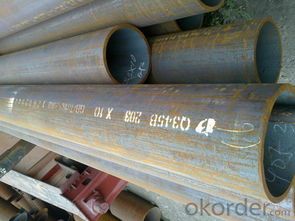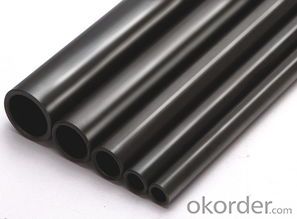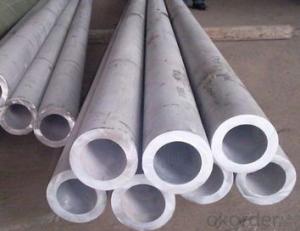Seamless Carbon Steel Pipe API 5L For Oil Application
- Loading Port:
- Tianjin
- Payment Terms:
- TT OR LC
- Min Order Qty:
- 25 m.t.
- Supply Capability:
- 10000 m.t./month
OKorder Service Pledge
OKorder Financial Service
You Might Also Like
Product Description:
1、Structure of Seamless Carbon Steel Pipe API 5L For Oil Application:
Seamless pipe is formed by drawing a solid billet over a piercing rod to create the hollow shell. As the manufacturing process does not include any welding, seamless pipes are perceived to be stronger and more reliable. Historically seamless pipe was regarded as withstanding pressure better than other types, and was often more easily available than welded pipe.
2、Main Features of Seamless Carbon Steel Pipe API 5L For Oil Application:
• High manufacturing accuracy
• High strength
• Small inertia resistance
• Strong heat dissipation ability
• Good visual effect
• Reasonable price
3、Seamless Carbon Steel Pipe API 5L For Oil Application Images:


Packaging & Delivery
Packaging Details: | seaworthy package,bundles wrapped with strong steel strip |
Delivery Detail: | 15-30days after received 30%TT |
4、Seamless Carbon Steel Pipe API 5L For Oil Application Specification:
Standard | GB, DIN, ASTM |
Grade | 10#-45#, 16Mn |
Thickness | 8 - 33 mm |
Section Shape | Round |
Outer Diameter | 133 - 219 mm |
Place of Origin | Shandong, China (Mainland) |
Secondary Or Not | Non-secondary |
Application | Hydraulic Pipe |
Technique | Cold Drawn |
Certification | API |
Surface Treatment | factory state or painted black |
Special Pipe | API Pipe |
Alloy Or Not | Non-alloy |
Length | 5-12M |
Outer Diameter | 21.3-610mm |
Grade | 20#, 45#, Q345, API J55, API K55, API L80, API N80, API P110, A53B |
Standard | ASME, ASTM |
1.Material:20#(ASTM A 106/A53 GRB.API5LGRB,GB),45#,16Mn,10#.
2.Specification range:OD:21.3-610mm,WT:6-70mm,length:6-12m or according to the requirement of clients.
3.Excutive standards:GB,ASME API5L.ASTM A 106/A53,Despite of the above standards,we can also supply seamless steel pipe with standard of DIN,JIS,and so on,and also develop new products according to the requirements of our clients!
4.Surface:black lacquered,varnish coating or galvanized.
5.Ends:Beveled or square cut,plastic capped,painted.
6.Packing:bundles wrapped with strong steel strip,seaworthy packing.
5、FAQ of Seamless Carbon Steel Pipe API 5L For Oil Application:
①How is the quality of your products?
Our products are manufactured strictly according to national and internaional standard, and we take a test
on every pipe before delivered out. If you want see our quality certifications and all kinds of testing report, please just ask us for it.
Guaranteed: If products’ quality don’t accord to discription as we give or the promise before you place order, we promise 100% refund.
②How about price?
Yes, we are factory and be able to give you lowest price below market one, and we have a policy that “ for saving time and absolutely honest business attitude, we quote as lowest as possible for any customer, and discount can be given according to quantity”,if you like bargain and factory price is not low enough as you think, just don’t waste your time.Please trust the quotation we would give you, it is professional one.
③Why should you chose us?
Chose happens because of quality, then price, We can give you both.Additionally, we can also offer professional products inquiry, products knowledge train(for agents), smooth goods delivery, exellent customer solution proposals.Our service formula: good quality+good price+good service=customer’s trust
SGS test is available, customer inspection before shipping is welcome, third party inspection is no problem.
Any question, pls feel free to contact us !
- Q:Can steel pipes be used for the construction of dams?
- Yes, steel pipes can be used for the construction of dams. Steel pipes are strong, durable, and have a high load-bearing capacity, making them suitable for various applications in dam construction, such as for penstocks, spillways, and drainage systems. They can withstand the pressure and weight exerted by water and are resistant to corrosion, which is crucial for the long-term stability and integrity of dams. Additionally, steel pipes can be easily fabricated and installed, making them a practical choice for dam construction projects.
- Q:What are the advantages of using steel pipes over other materials like PVC or copper?
- There are several advantages of using steel pipes over other materials like PVC or copper. Firstly, steel pipes are extremely durable and can withstand high pressure and extreme temperatures, making them ideal for various applications including industrial and underground use. Secondly, steel pipes have a longer lifespan compared to PVC or copper, reducing the need for frequent replacements and maintenance. Additionally, steel pipes are more resistant to corrosion and are not prone to cracking or leaking, ensuring a reliable and leak-free plumbing system. Lastly, steel pipes have a higher fire resistance rating compared to PVC, making them a safer option for certain environments.
- Q:How are steel pipes used in the pulp and paper industry?
- Steel pipes are commonly used in the pulp and paper industry for various applications including transporting water, steam, and chemicals throughout the manufacturing process. They are also used for conveying pulp and paper products, as well as for supporting structures such as boiler systems and storage tanks.
- Q:How are steel pipes used in the manufacturing of aerospace components?
- Steel pipes are commonly used in the manufacturing of aerospace components for various purposes such as fuel and hydraulic systems, structural supports, and exhaust systems. These pipes provide strength, durability, and resistance to high temperatures and pressure, making them suitable for critical applications in the aerospace industry.
- Q:Is the electric pipe used with steel pipe or PVC pipe?
- Electric pipe laying is generally divided into the following circumstances:1) the explosion-proof area must be galvanized steel pipe and explosion proof flexible pipe (used for front end equipment connection);2) non explosion-proof area can use KBG pipe or PVC tube, the former is higher cost, but the installation is firm, the latter is low cost, easy to construction, and in the rain where it will not rust, but compared to the KBG pipe may be damaged.
- Q:What's the difference between round and round tubes?
- Round steel is generally refers to steel, the surface is not threaded, different from round steel pipe, round tube is round tube.
- Q:What are the different methods of measuring the thickness of steel pipes?
- There are several methods of measuring the thickness of steel pipes, including ultrasonic testing, magnetic particle testing, eddy current testing, and laser scanning.
- Q:What are the advantages of using steel pipes in industrial plants?
- Using steel pipes in industrial plants offers numerous advantages. Firstly, their exceptional strength and durability make them ideal for transporting materials and fluids under high temperatures, pressures, and heavy loads. Secondly, steel pipes have excellent resistance to corrosion, which is crucial in industrial settings where they encounter corrosive substances or harsh environmental conditions. This resistance ensures their longevity, prevents leaks, and eliminates potential hazards. Additionally, steel pipes are highly versatile. They can be easily fabricated and customized to meet specific requirements, including different sizes and shapes. This flexibility simplifies installation and maintenance, reducing downtime and improving overall efficiency. Moreover, steel pipes have a smooth interior surface, allowing for efficient material flow with minimal resistance and pressure drop. Their smoothness also prevents the accumulation of deposits and contaminants, ensuring a clean and hygienic environment. Furthermore, steel pipes exhibit high resistance to fire, providing an added layer of safety in industrial plants where fires can have disastrous consequences. Lastly, while the initial installation cost of steel pipes may be higher compared to other materials like plastic or copper, their durability and low maintenance requirements result in significant long-term cost savings. With a long lifespan and resistance to corrosion and damage, the need for frequent replacements or repairs is minimized. In conclusion, the use of steel pipes in industrial plants offers various advantages, including strength, durability, corrosion resistance, versatility, efficient flow, fire resistance, and cost-effectiveness. These qualities make steel pipes a reliable and efficient choice for diverse applications within industrial facilities.
- Q:What are the different methods of pipe bending for steel pipes?
- There are several methods of pipe bending for steel pipes, each with its own advantages and limitations. 1. Manual Pipe Bending: This method involves using hand tools or a manual pipe bender to bend the steel pipe. It is suitable for small-scale projects or when only a few bends are required. However, it requires skill and precision to ensure accurate and consistent bends. 2. Rotary Draw Bending: This method utilizes a mandrel, clamp die, and a bending die to bend the pipe around a stationary bend die. The mandrel helps to maintain the shape and prevent wrinkling or collapsing of the pipe during the bending process. Rotary draw bending is commonly used for producing tight-radius bends with high accuracy and repeatability. 3. Induction Pipe Bending: In this method, an induction coil is used to heat a specific area of the steel pipe, making it more malleable for bending. Once the desired temperature is reached, the pipe is bent using hydraulic or mechanical force. Induction bending is suitable for large-diameter pipes or when multiple bends are required in a single pipe. 4. Roll Bending: Also known as pyramid rolling, this method involves passing the steel pipe through three adjustable rolls that gradually bend the pipe into the desired shape. Roll bending is suitable for producing large-radius bends and is commonly used in the construction of spiral staircases, handrails, and structural applications. 5. Hot Bending: This method involves heating the steel pipe to high temperatures, typically using a furnace, to facilitate bending. Hot bending allows for greater flexibility in shaping the pipe and is commonly used for large-diameter or thick-walled pipes. However, it requires specialized equipment and expertise to control the temperature and prevent distortion or damage to the pipe. It is important to consider factors such as the required bend radius, pipe diameter, wall thickness, and project specifications when selecting the appropriate method of pipe bending for steel pipes. Consulting with an experienced pipe bending professional or engineer can help determine the most suitable method for a specific application.
- Q:What are the different types of steel pipe coatings for marine applications?
- There are several types of steel pipe coatings commonly used for marine applications, including epoxy coatings, polyurethane coatings, and fusion bonded epoxy (FBE) coatings. These coatings are designed to protect the steel pipe from corrosion and provide resistance to marine environments. Epoxy coatings are known for their excellent adhesion and chemical resistance, while polyurethane coatings offer enhanced abrasion resistance. FBE coatings are highly durable and provide excellent corrosion protection. The choice of coating depends on the specific requirements of the marine application and the level of protection needed.
1. Manufacturer Overview |
|
|---|---|
| Location | |
| Year Established | |
| Annual Output Value | |
| Main Markets | |
| Company Certifications | |
2. Manufacturer Certificates |
|
|---|---|
| a) Certification Name | |
| Range | |
| Reference | |
| Validity Period | |
3. Manufacturer Capability |
|
|---|---|
| a)Trade Capacity | |
| Nearest Port | |
| Export Percentage | |
| No.of Employees in Trade Department | |
| Language Spoken: | |
| b)Factory Information | |
| Factory Size: | |
| No. of Production Lines | |
| Contract Manufacturing | |
| Product Price Range | |
Send your message to us
Seamless Carbon Steel Pipe API 5L For Oil Application
- Loading Port:
- Tianjin
- Payment Terms:
- TT OR LC
- Min Order Qty:
- 25 m.t.
- Supply Capability:
- 10000 m.t./month
OKorder Service Pledge
OKorder Financial Service
Similar products
New products
Hot products
Related keywords






























